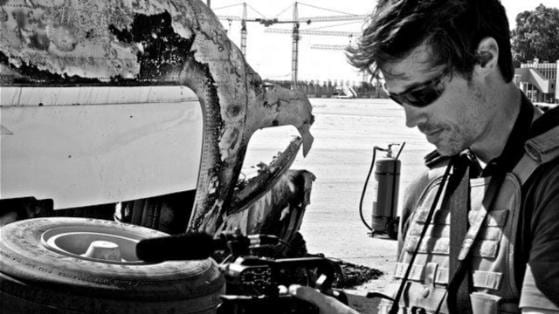 Visiting fellow Florian von Heintze, Deputy Editor-in-Chief of BILD, reflects on the death of James Foley and shares the words of Julian Reichelt, BILD.de’s Editor-in-Chief.
Visiting fellow Florian von Heintze, Deputy Editor-in-Chief of BILD, reflects on the death of James Foley and shares the words of Julian Reichelt, BILD.de’s Editor-in-Chief.
64 journalists, media assistants and bloggers were killed this year so far on their job, according to the German association “Reporter ohne Grenzen” (Reporters Without Borders) — more than ever since its first published report in 1995. US reporter James Foley (40) was the 10th deadly victim in Syria this year. Almost 30 journalists have been killed there since the outbreak of the civil war in 2011. Julian Reichelt (34) has been covering wars in Afghanistan, Iraq, Lebanon and Syria for years. He met James Foley occasionally on the job and always admired him for his courage, his curiosity, and his storytelling. Last year Reichelt was named Editor-in-Chief of Germany’s leading news website BILD.de (www.bild.de) with 300 million page impressions monthly. He is based in Berlin. Here is what he wrote about Foley’s death.

Photo from BILD.de
Below is the commentary published today by Julian Reichelt, Editor-in-chief of BILD.de:
The death of our colleague James Foley, who was beheaded by terrorists, leaves us horrified and aghast. The way he had to die is sickening us.
I did not know him very well; we were not friends, but I knew him well enough to imagine what might have been important for him to say. Before him, hundreds of Syrians and Iraqis were murdered the way he was. Scornfully, barbarically. Helplessly, powerlessly facing death.
James Foley lived to report about these people: the defenseless, the overpowered, the nameless. It would have been important to him to remember them, too — all those forgotten souls that lie in the mass graves of Syria and Iraq.
It is embarrassing that a western journalist had to die in order to hammer the brutality of the ISIS-terrorists into our awareness.
And it is typical that the whole of western politics reacts stronger to this murder than to the hundreds of thousands of murders that Foley documented in Syria. His death tells the story he wanted to tell with his camera: that the boundless violence in the Arabic world is a catastrophe of our time, a threat to our civilization.
With his work, James Foley wanted to shake us up. His pictures from the war in Syria, where ISIS started to build up, begged us to stop the killing. We did not prevent it. We did not stop it. We watched passively, first when Assad gasified children, and later when ISIS started to behead and crucify people.
You cannot escape these crazy killing sprees. You can only counter them with determination. That is the message of the killing of James Foley.
Rest in peace, James Foley. We will miss you and your work!